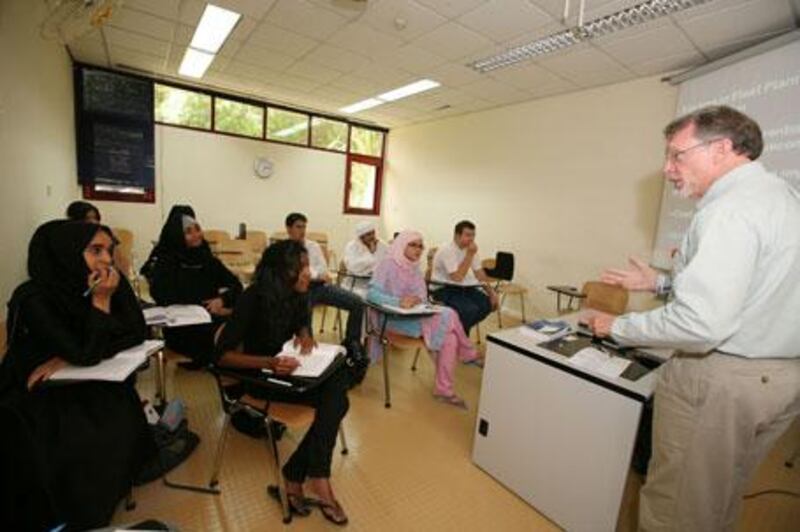Dubai // As David Worrells prepares to begin an afternoon lecture on the finer points of airline management at Dubai's Emirates Aviation College, a clicking of high heels and the occasional giggle announce the arrival of his students. During a decade of teaching aviation courses in the United States, Prof Worrells was used to a male-dominated classroom. In Dubai, it is a different matter altogether. Women outnumber the men in his classes and on top of that, they are consistently outperforming their male counterparts in many areas, graduating with flying colours. The women confidently grapple with the complexities of aviation management, contract negotiations and the more technical aspects of aircraft design. And their ambitions are significantly more lofty then the traditional female path of becoming cabin crew; they are setting their sights on a career in air traffic control or management. "When I got here in November, I noticed I had lots and lots of women in my classes, 40 to 60 per cent," says Prof Worrells, who teaches several undergraduate and graduate classes at EAC. In America, they'd be 10 per cent at most." In one recent lecture, six of his nine students were women. Of 100 students studying air transportation management, well over half are female. Officials at Emirates Group, which owns Emirates Airline and EAC, the country's most renowned aviation education institution, declined to give statistics on the university's student body but Prof Worrells says the number of enrolled women, even those taking such stereotypically male courses as engineering, are on the rise. At a recent class on airline fleet planning, the female students diligently scribbled down notes, raised hands and asked more questions than their male classmates during discussions about industry competition. Prof Worrells says the male-female imbalance provides for some animated classroom debates and healthy competition. "When I looked at test results and the writing assignment results, the women tend to do better than the guys - spelling, grammar, analysis, reasoning, following the instruction." His female students are primarily unmarried expatriates whose families moved to the UAE to get away from developing, and in some cases strife-torn, countries, including Iraq, Pakistan and Syria. "I tell people I'm at Emirates Aviation College, and they're like, 'Oh, you're going to be cabin crew?'" says Kiran Jayaprakash, 20, an Indian student who is interested in becoming an air traffic controller. "Even my own family members still tell people I'm going for something like cabin crew." Some of the women are openly going against their parents' expectations of an early marriage and family. The UAE's socially liberal atmosphere, they say, has offered enticing opportunities that may not be available in their countries of origin. "I want to be independent, I want to prove myself," says Sanam Zafar, a 21-year-old Pakistani who, in her white headscarf, listens attentively as Prof Worrells explains the importance of diversifying one's fleet with several different models of aircraft. She is the first member of her family to attend university and resisted initial pressure from her parents to study such traditionally regarded professions in Pakistan as medicine and engineering. "My father wanted me to be a doctor, but I told him I hated chemistry and physics. Then he wanted me to do dentistry here, and I said, 'No way,'" says Ms Zafar, who is pursuing a bachelor's degree and intends to enter the aviation field when she graduates next year. "In Pakistan, I say I'm studying air transport management, and they usually just say, 'What?'" In the third of four years of her air transport management course, Sabaah Mohammed, 20, says many of her male classmates at EAC have dropped out of the programme. "We started three years ago, and a lot of the men have left. We women, you know, we're independent." Regardless, their employment prospects in the Gulf are growing. About 40 per cent of Emirates Airline's 40,000 employees are women, employed as pilots, cabin crew, engineers and in operational jobs. Of Etihad Airways' 7,300-strong staff, who come from 120 different countries, 3,440 are women. Roughly 2,800 of them work in the sales and services section, which includes cabin crew employees, while another 260 work in marketing and human resources. "There are strong opportunities for women at our organisation, including as pilots," says a spokesperson for the Abu Dhabi-based carrier. "Of our seven groups of cadet pilots who are currently in training, there are about 10 women from all over the world, including the UAE." Yet, despite growing job prospects in the Gulf and their undoubted talent and determination to become high flyers in the aviation world, the female students are aware they must still overcome the hurdle of social expectations. "My parents want me to stand on my own two feet," says Ms Mohammed. "But once I have that certificate in my hand, then they'll want me to think about marriage. "Sometimes I wonder if our own families know what we're getting into. "I mean, we're studying to be in management positions." hnaylor@thenational.ae
For women in Dubai, sky is no limit
Women outnumber and outperform their male counterparts at Dubai's Emirates Aviation College, and have lofty ambitions.

Editor's picks
More from the national





